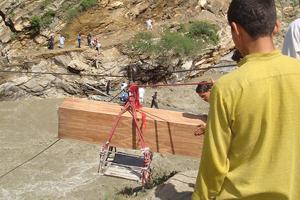
A dead boy’s coffin is transported over a washed-out area via a rope trolley in northern Pakistan, where massive flooding has killed over 1000 people and destroyed thousands of homes. Catholic Relief Services is helping flood survivors with items such as water purification tablets, soap, buckets, and cookware. CRS is also planning to distribute emergency shelter kits.
Credits: Catholic Relief Services Staff, Bersham
Caritas says the challenge to getting aid to flood victims in Pakistan is massive as communities are still cut off by high waters and some areas can only be reached by foot.
Floods in the north have affected an estimated three million people and killed over 1500. Houses, bridges and roads have been washed away leaving people without food, shelter and drinking water.
“The situation is going from bad to worse and more rains are predicted,” says says Eric Dayal, emergency officer for Pakistan. “As we try to do assessments and deliver aid we’re faced with the major challenges of high waters, which means staff are sometimes travelling by foot in the worse-hit areas, and broken phone and electricity lines which make communications very difficult.”
Caritas has carried out assessments in parts of Balochistan, Punjab and Khyber Pakhtunkhwa. The focus is on moving aid items into accessible areas as quickly as possible and on trying to reach areas that have so far been cut off for assessments. Apart from the difficulties presented by floodwaters, some communities present further challenges as they are in mountainous and isolated areas with poor infrastructure and a high level of poverty.
Caritas will initially provide 1,500 families in Peshawar with water, food, cooking utensils, health and hygiene kits for an initial two week period. Caritas will also distribute mosquito nets, water purification tablets, hygiene kits and kitchen supplies to 1350 households in Karkhan and Kohlu.
Last week Caritas’ focus was on providing emergency relief items to 1300 families in two districts of southern Punjab. Furthermore, Caritas has been looking at setting up cash-for-work programmes to provide people with some form of income after the floods damaged their cattle and crops.
Caritas staff on the ground report of districts such as Shangla in Khyber Pakhtunkhwa where water is getting scarce, the markets no longer work and where there’s no fuel.
Hospitals and health centres have also been damaged, making life difficult for the sick and injured. As floodwaters recede, there are increased fears that communities will suffer a further blow as a result of cholera and water-borne diseases.
As a clearer picture of the extent of the disaster emerges, Caritas is looking at launching an initial three-month programme to cover the worst-affected areas. But the fact that some communities still can’t be reached by staff and with the threat of further rains, an overall picture is emerging only slowly.
For more information, please contact Michelle Hough on +39 06 69879721/+39 334 2344136 or [email protected]
